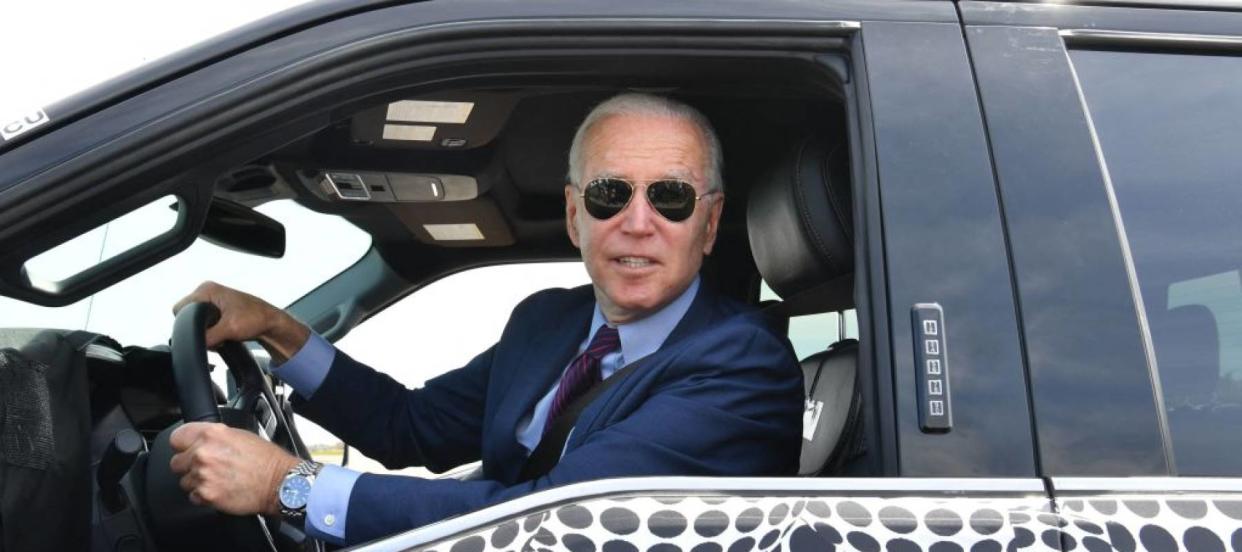‘Just another debacle’: Ford is cutting production of its electric pickup — the same truck Joe Biden drove to push EVs in America. Former Chrysler CEO says infrastructure is 'not there'

The launch of Ford's electric pickup, the F-150 Lightning, was a significant event, even drawing commendation from President Joe Biden, who expressed his admiration for the vehicle's speed after test driving it in 2021.
Don’t miss
Commercial real estate has outperformed the S&P 500 over 25 years. Here's how to diversify your portfolio without the headache of being a landlord
Jeff Bezos and Oprah Winfrey invest in this asset to keep their wealth safe — you may want to do the same in 2024
Take control of your finances in 2024: 5 money moves to start the new year off strong
“This sucker’s quick,” Biden remarked, impressed by the vehicle's performance.
However, despite the ongoing increase in electric vehicle adoption in America, the journey for the F-150 Lightning has not been as seamless as anticipated.
Matching production to customer demand
Recently, Ford announced that it would reduce production of its electric pickup truck, explaining that the decision aligns with the objective of “matching F-150 Lightning production to customer demand.”
This development led Bob Nardelli, the former CEO of Chrysler, to voice criticism towards the Biden administration's advocacy for electric vehicles.
“I think this whole EV is just another debacle in a long list of issues for this administration,” he said in a recent interview with FOX Business.
He added, “At one point last year [Ford] had over 100 days of inventory. So Jim Farley had no choice but to cut production. He had all that working capital tied up. The dealers were upset because they weren't moving products.”
To be sure, Ford managed to sell 24,165 F-150 Lightning trucks in 2023, which marked a 55% increase from 2022.
However, the majority of Ford's pickup truck customers still preferred models equipped with an internal combustion engine, as evidenced by the company's total sales of 750,789 F-Series vehicles for 2023.
Read more: This Pennsylvania trio bought a $100K abandoned school and turned it into a 31-unit apartment building — how to invest in real estate without all the heavy lifting
From range anxiety to charging anxiety
Nardelli also highlighted the challenges associated with the transition to EVs, specifically the issue of charging infrastructure.
“You look at the recent debacle we've seen with the weather where people can no longer get their cars charged. Their batteries go dead overnight because they're trying to automatically keep them warm so they can accept the charge,” he said.
“So the infrastructure is just not there. We've moved from range anxiety to charging anxiety.”
Nevertheless, there are efforts underway to expand the charging infrastructure.
Tesla, for instance, has established a global network of more than 50,000 Superchargers, which the company claims can add up to 200 miles of range in a mere 15 minutes.
Ford customers are set to benefit from these developments, too. Last year, Ford announced that, starting in spring 2024, its EV customers will gain access to more than 12,000 Tesla Superchargers across the U.S. and Canada.
This initiative complements the already existing network of more than 10,000 DC fast-chargers included in the BlueOval Charge Network.
Moreover, the government is contributing to addressing this issue. Specifically, the Biden administration's Bipartisan Infrastructure Law — with an investment of $7.5 billion in EV charging infrastructure — which aims to establish a national network of 500,000 EV chargers.
What to read next
Robert Kiyosaki warns: ‘Cash is trash’ — Discover the power of diversifying with gold now
Only 20% of Americans are confident they'll have a comfortable retirement — use this 1 magic move to get back on track ASAP (It will only take seconds but most people don't do it.)
Millions of Americans are in massive debt in the face of rising rates. Here's how to take a break from debt this month
This article provides information only and should not be construed as advice. It is provided without warranty of any kind.
